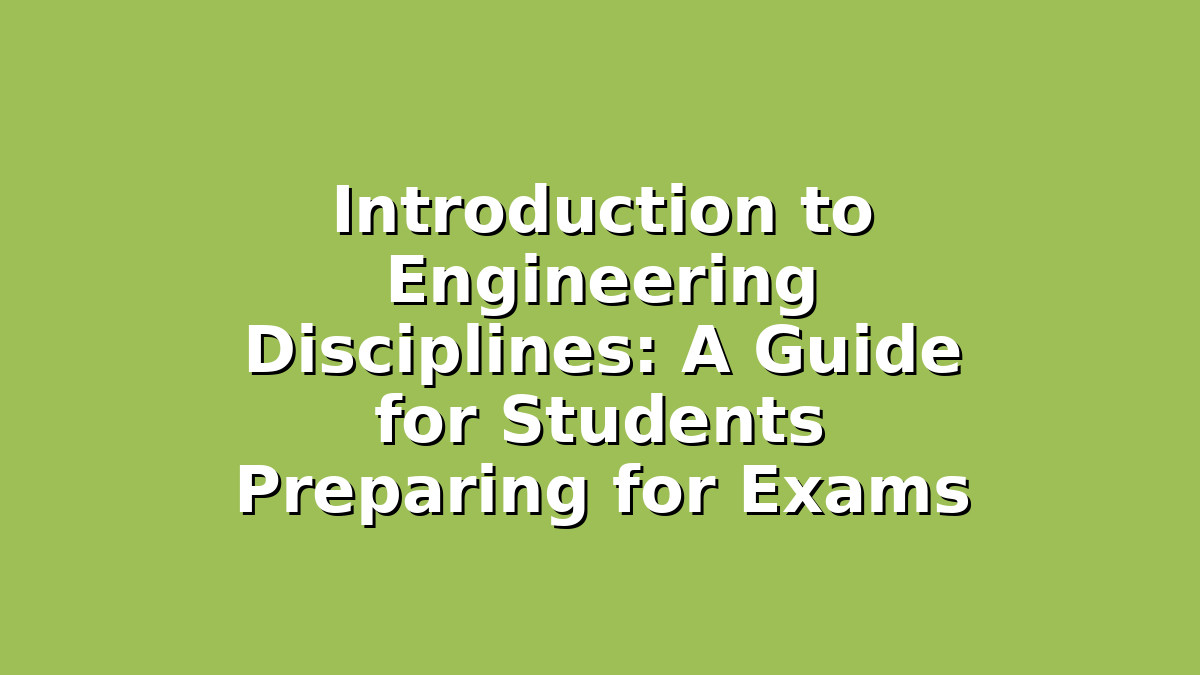Choosing to pursue engineering is an exciting decision that opens doors to a world filled with innovation and problem-solving. Whether you’re a high school student considering engineering as your future career or a college student preparing for exams, understanding the different engineering disciplines is crucial. Not only will this knowledge help you make informed choices about your specialization, but it will also enable you to tailor your study strategies effectively. In this article, we’ll explore three major engineering disciplines—Mechanical, Electrical, and Civil Engineering—highlighting their core concepts and offering practical study tips to help you excel in your exams.
1. Mechanical Engineering: Mastering the Physical World
Mechanical engineering is one of the oldest and broadest branches of engineering. It revolves around designing, analyzing, and manufacturing mechanical systems. If you enjoy understanding how machines work, from engines to HVAC systems, this discipline might be for you.
#### Core Concepts to Focus On
– Statics and Dynamics: Study the forces and motion of bodies at rest and in motion.
– Thermodynamics: Understand energy transfer, heat, and work.
– Materials Science: Learn about different materials and their properties.
– Fluid Mechanics: Explore the behavior of fluids—liquids and gases—in various environments.
#### Study Tips for Mechanical Engineering Students
– Visualize Concepts: Mechanical engineering involves a lot of physical systems. Use diagrams, 3D models, and simulation software to visualize problems.
– Practice Problem-Solving: Work on numerical problems frequently. Mechanics and thermodynamics often require step-by-step calculations.
– Group Study: Collaborate with peers to discuss design problems or lab experiments, which can deepen your understanding.
– Use Flashcards: For formulas and key concepts, flashcards can help reinforce memory.
– Apply Real-World Examples: Try to relate theory to everyday machines or engineering marvels you see around you to make studying more interesting.
2. Electrical Engineering: Harnessing the Power of Electricity
Electrical engineering is essential in today’s technology-driven world. This discipline involves the study and application of electricity, electronics, and electromagnetism. If circuits, signal processing, or communications excite you, electrical engineering offers a fascinating career path.
#### Core Concepts to Focus On
– Circuit Theory: Learn about resistors, capacitors, inductors, and how circuits operate.
– Electromagnetism: Study electric fields, magnetic fields, and how they interact.
– Digital Systems: Understand logic gates, microprocessors, and computing basics.
– Control Systems: Explore how systems are controlled automatically and manually.
#### Study Tips for Electrical Engineering Students
– Master the Basics: Build a strong foundation in mathematics, especially calculus and linear algebra, as they’re essential for circuit analysis.
– Simulation Tools: Use software like MATLAB, Multisim, or LTspice to simulate circuits and visualize results.
– Solve Past Exam Papers: Electrical engineering often involves standard problem types. Practicing past papers will familiarize you with the question style and time management.
– Create Summary Sheets: Compile key formulas, laws (like Ohm’s and Kirchhoff’s), and circuit theorems into concise sheets for quick revision.
– Hands-On Practice: If possible, build simple circuits using breadboards or kits. Hands-on learning reinforces theoretical knowledge.
3. Civil Engineering: Building the Foundations of Society
Civil engineering focuses on designing, constructing, and maintaining infrastructure such as roads, bridges, buildings, and water systems. It blends creativity with technical skills and is ideal for students interested in large-scale projects that impact communities.
#### Core Concepts to Focus On
– Structural Analysis: Understand how forces affect buildings and bridges.
– Geotechnical Engineering: Study soil mechanics and foundation design.
– Transportation Engineering: Learn how to design and manage transportation systems.
– Environmental Engineering: Focus on water supply, waste management, and sustainable design.
#### Study Tips for Civil Engineering Students
– Draw and Label Diagrams: Civil engineering problems often involve structural components. Sketching helps you visualize forces and stresses.
– Focus on Units and Dimensions: Pay close attention to units in calculations; errors here can lead to wrong answers.
– Use Software Tools: Familiarize yourself with AutoCAD, STAAD Pro, or other civil engineering software to aid in understanding and design.
– Memorize Codes and Standards: Many civil engineering exams include questions on building codes, safety standards, and environmental regulations.
– Practice Numerical Problems: Apply formulas repeatedly through practice problems to gain confidence and speed.
Conclusion
Choosing the right engineering discipline is a significant step that shapes your academic journey and career path. Whether you’re drawn to the mechanics of machines, the intricacies of electrical systems, or the challenges of constructing infrastructure, each engineering field requires dedication and strategic study approaches. By focusing on core concepts, practicing problem-solving, using appropriate tools, and connecting theory to real-world applications, you can enhance your understanding and increase your chances of exam success.
Remember, engineering is not just about memorizing formulas; it’s about developing critical thinking and problem-solving skills. Stay curious, consistent, and proactive in your studies. With the right mindset and study habits, you will not only excel in your exams but also prepare yourself for a rewarding engineering career.
Good luck on your journey to becoming an engineer!

Responses